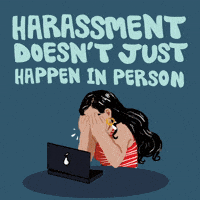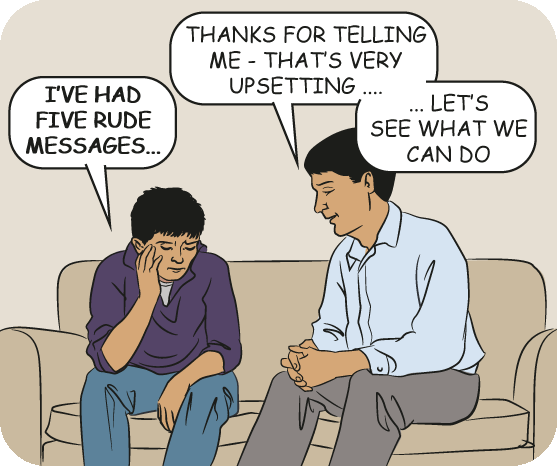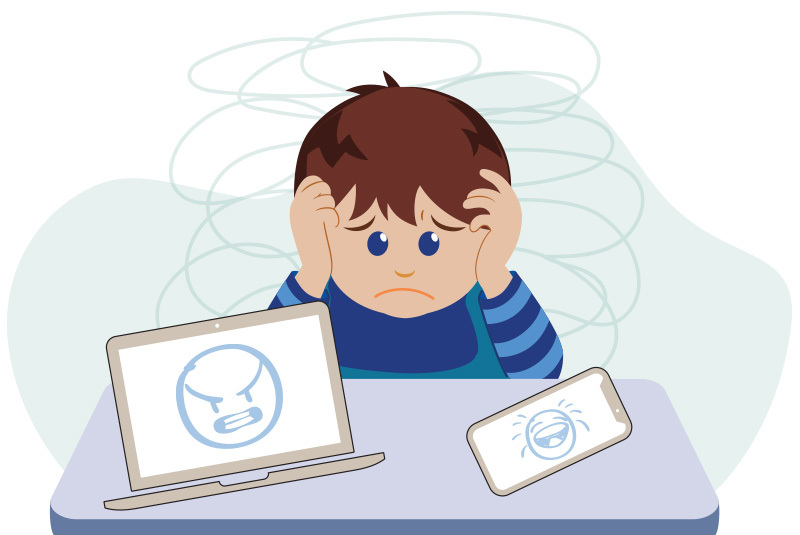Cyberbullying
With the increase in the use of digital platforms, people feel they can say and post whatever they feel like. They are not bothered about the harmful effects their post might have on some other person. People find it so easy to troll and make memes on others… Trolling and making fun of others or being rude to them is a form of bullying which is done online… This online bullying is known as CYBERBULLYING. According to UNICEF, Cyberbullying is bullying with the use of digital technologies. It can take place on social media, messaging platforms, gaming platforms and mobile phones. It is repeated behaviour, aimed at scaring, angering or shaming those who are targeted. It includes sending, posting, or sharing negative, harmful, false, or mean content about someone else.

The most common places where cyberbullying occurs are: (as mentioned in stopbullying.gov)
- Social Media, such as Facebook, Instagram, Snapchat, and Tik Tok
- Text messaging and messaging apps on mobile or tablet devices
- Instant messaging, direct messaging, and online chatting over the internet
- Online forums, chat rooms, and message boards, such as Reddit
- Online gaming communities
People who experience cyberbullying can have symptoms of depression including sadness, loneliness, insecurity, poor self-esteem, academic decline, feelings of not belonging, and suicidal thoughts and behaviour. Kidshealth.org mentioned that the signs of cyberbullying vary, but may include:
- being emotionally upset during or after using the Internet or the phone
- being very secretive or protective of one’s digital life
- spending more time than usual in their room
- withdrawal from or lack of interest in family members, friends, and activities
- avoiding school or group gatherings
- slipping grades and “acting out” in anger at home
- changes in mood, behaviour, sleep, or appetite
- suddenly wanting to stop using the computer or device
- being nervous or jumpy when getting a message, text, or email
- avoiding discussions about computer or phone activities
WHAT PARENTS CAN DO???

Most kids are afraid to talk or discuss with their parents because they feel their parents will restrict their online activities. They have a fear that parents might take away their phones or laptops… According to me, first of all, parents should create a comfortable environment for their kids so that they can share their feelings. Parents must offer comfort and supports to their children. Sometimes kids feel that they are being targeted is their fault, they feel that there is some type of fault within them but that is not the case. As parents, we must convince our kids that it’s not their fault, alternatively praise them for sharing their problems with us. Moreover, parents can notify the school, so that they monitor their child’s behaviour and performance in class. Also, guide your child not to respond to cyberbullying. As a parent, we must keep records such as screenshots, pictures etc. for evidence and if possible or if you feel that your child is being affected more than consult a therapist. But in my view, before sending a kid to a therapist ask kids whether they are comfortable or not. Because I believe our kids’ comfort is the main thing that we should keep in mind.
While you may not be able to monitor all of your child’s activities, there are things you can do to prevent cyberbullying and protect your child from harmful digital behaviour: (Source: stopbullying.gov)
- Monitor a teen’s social media sites, apps, and browsing history, if you have concerns that cyberbullying may be occurring.
- Review or re-set your child’s phone location and privacy settings.
- Follow or friend your teen on social media sites or have another trusted adult do so.
- Stay up-to-date on the latest apps, social media platforms, and digital slang used by children and teens.
- Know your child’s user names and passwords for email and social media.
- Establish rules about appropriate digital behaviour, content, and apps.
Prevnet.ca illustrated that parents should set family guidelines and rules for online behaviour. Encourage teens to think about how they would feel if they were the target of cyberbullying.
- Always keep your computer in a common area, like the kitchen, so you can monitor online activity and reactions to online communication.
- Always charge all cell phones in your room overnight.
- Always set up email, chat accounts and blogs with your children so you are aware of the type of information they are posting online. Keep a list of your teen’s IM and email contacts so you can verify each person.
- Always encourage your child to apologize to the person they have hurt. Emphasize the consequences if bullying does not stop – the effect it has on other people, the loss of all cellphone and Internet privileges, and possibly, legal consequences.

Luckily, I have never been a victim of cyberbullying or faced bullying… but I have seen teens who have been a victim of this. People who post harsh things for others don’t realize their effects on others. I think the only way through which we can help others is by creating a healthy environment for them so that they can talk and share the harsh things they are facing in their lives.
Oftentimes, I find that cyberbullying falls on the plates of teachers and schools. Too often, parents will let schools know of what is going on and then make it the school’s job to work through it with their kiddos, or to get the right authorities involved. It can be problematic, especially if cyberbullying is mainly happening outside of school time. It can be very difficult to deal with these situations at the school level, and often resources officers will get involved if it is serious enough. I do like the section that you included about what parents can do. It would be helpful if there were more community outreach programs that helped educate parents/guardians.
Thanks for this Shristy! And yes Kelly, I would have to agree that so much cyberbullying falls on the schools and teachers. It’s such a sticky topic that I’m not sure schools/teachers/parents and students are confident in the ways we are addressing cyberbullying. I think its best practice to have the SRO or admin to meet with both parents and have a chat. I love that you included a parent check-in section! I would be so irate if i found my kids being mean to someone, loss of privilege for eternity!